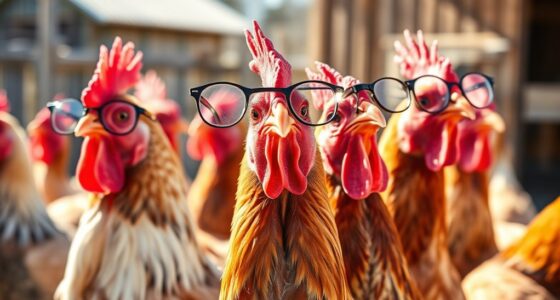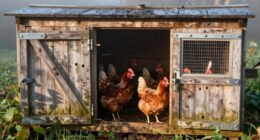Farmers use chickens’ ability to recognize over 100 individual faces to improve flock management and welfare. By familiarizing chickens with regular handlers, they build trust and reduce stress during routines like feeding and health checks. Recognizing flock mates helps maintain social order and minimizes conflicts. Understanding this skill allows you to manage your chickens more effectively and create a calmer environment. Stay with us to uncover how you can harness this impressive trait in your own flock.
Key Takeaways
- Farmers build trust with chickens through consistent face recognition, making daily chores easier and less stressful.
- Recognizing individual faces helps farmers monitor health and identify new or problematic flock members efficiently.
- Familiarity with human faces reduces chickens’ fear, leading to calmer behavior during handling and routine interactions.
- Using recognition skills, farmers can better manage social dynamics within the flock, minimizing conflicts and establishing order.
- Understanding chickens’ memory of faces promotes humane practices, enhances welfare, and fosters stronger human-animal bonds.

Chickens are often underestimated, but recent research shows they can recognize and remember individual faces for extended periods. This ability highlights a level of avian recognition that many farmers overlook. Understanding poultry memory isn’t just a fascinating science fact; it has practical applications that can improve flock management and animal welfare. When you realize that chickens can distinguish between faces, you start to see them as more than just simple farm animals—they’re intelligent creatures capable of complex social interactions.
Chickens recognize faces and remember them, revealing their surprising intelligence and social complexity.
Your chickens remember you, and they remember each other. They recognize the faces of their flock mates and even those of humans who regularly interact with them. This avian recognition plays a vital role in their social dynamics, helping reduce stress and establish hierarchies within the flock. When you approach your chickens, they don’t just see a stranger; they identify you, which can influence their behavior. If you’re consistent in your routine, they quickly learn to trust you, and your presence becomes familiar rather than frightening. This is because poultry memory allows chickens to retain these visual cues over long periods, sometimes months, reinforcing social bonds and reducing anxiety.
Farmers who understand this face recognition capacity use it to foster better relationships with their chickens. For example, regular handlers who spend time with their flock often notice that chickens respond positively to familiar faces. This can make routine chores like feeding, cleaning, or health checks smoother and less stressful for everyone. Recognizing individual chickens also helps farmers identify specific needs or health issues quickly. If a particular bird is acting differently, it’s easier to pinpoint and care for that chicken when you remember its face and personality.
Moreover, avian recognition extends beyond just human interactions. Chickens recognize each other’s faces, which helps maintain social order and reduce conflicts within the flock. When you observe chickens calmly ignoring or accepting certain members, it’s partly due to their ability to remember and differentiate between faces. You can use this knowledge to manage your flock better by introducing new birds gradually, allowing them to recognize and integrate into the existing social structure more easily.
In essence, understanding poultry memory and avian recognition isn’t just about appreciating your chickens’ intelligence; it’s a fundamental tool to improve their well-being and your farm’s efficiency. By acknowledging their capacity to remember faces, you can build trust, reduce stress, and create a more harmonious environment. It’s a reminder that even animals often dismissed as simple can display remarkable cognitive skills when you take the time to notice.
Frequently Asked Questions
How Long Can Chickens Remember Individual Faces?
You might wonder how long chickens can remember individual faces. Their visual recognition skills are impressive, allowing them to distinguish specific faces for extended periods. Typically, their memory duration for recognizing individuals can last several weeks, sometimes even months, if they regularly interact with those faces. This ability helps chickens build social bonds and maintain stable flock dynamics, showcasing their remarkable cognitive skills in recognizing and remembering faces over time.
Do Chickens Recognize Humans or Only Other Chickens?
You might think chickens only recognize their fellow birds, but they actually recognize humans too. They can remember faces, especially those who feed them or care for their chicken diet, which impacts egg production. When you consistently interact with chickens, they start to see you as a familiar face, like an old friend. This recognition helps build trust and can improve their well-being and productivity—proof that chickens are smarter than they look.
Can Chickens Differentiate Between Familiar and Unfamiliar Faces?
You might wonder if chickens can tell familiar from unfamiliar faces. They do, based on facial expressions and environmental cues. When they see someone they’ve met, they recognize subtle differences in facial features and body language. If someone’s unfamiliar, chickens often show caution or curiosity. This ability helps them navigate their environment, avoid threats, and feel secure around known individuals, demonstrating their impressive social cognition.
How Does Face Recognition Benefit Chicken Social Behavior?
Imagine you’re a farmer observing chickens. Face recognition helps them identify familiar flock mates, which boosts social bonding. This visual recognition reduces stress and conflicts, fostering a harmonious environment. When chickens recognize each other’s faces, they feel more secure and comfortable, strengthening their social groups. So, face recognition directly benefits their social behavior by promoting trust and cooperation within the flock.
Are There Variations in Face Recognition Abilities Among Different Chicken Breeds?
You might wonder if breed differences affect recognition accuracy among chickens. Research shows that some breeds excel at face recognition, likely due to genetic variations influencing cognitive skills. These differences mean certain breeds are better at identifying and remembering individual faces, enhancing social bonds. Recognizing breed-specific traits helps farmers select chickens with stronger recognition abilities, promoting healthier social interactions and reducing stress within flocks.
Conclusion
So, next time you see a chicken pecking around, remember it might recognize your face—and remember your mistakes. It’s ironic how such simple creatures can hold onto faces for months, yet we often forget the importance of genuine recognition ourselves. Maybe, in the end, chickens teach us a lesson: don’t underestimate the power of memory—and perhaps, be nicer to the farm birds who might just be watching. After all, they remember more than you think.









